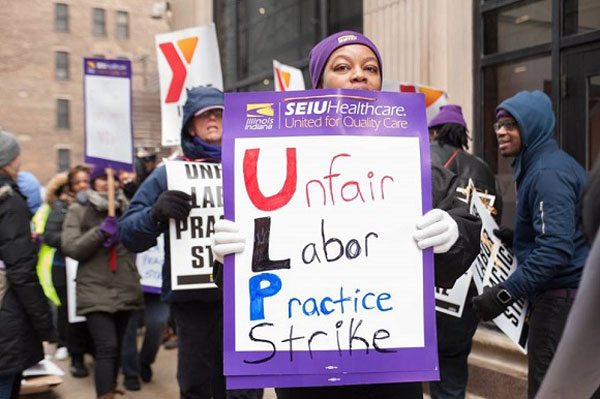
March 5, 2018; WBBM News Radio and In These Times
A one-day strike by a small band of child care workers in Chicago again poses difficult questions that the nonprofit sector struggles to answer. Is the financial stress an organization faces reason enough to ask employees to accept inadequate pay? Are the values an organization upholds in support of its clients different from those it uses to with its personnel? Is there a problem with nonprofit executive salaries?
Earlier this month, a one-day strike by the YMCA of Metropolitan Chicago’s unionized childcare staff forced 10 early childhood sites to close their doors and made the families they serve scramble for alternate arrangements for their children. The workers, represented by the Service Employees International Union (SEIU) made the decision to strike to illustrate the difficult situation they face because of the Y’s pay scale.
Greg Kelley, president of SEIU Healthcare Illinois & Indiana, told WBBM that “half of the workers here make minimum wage….we are talking about workers, who in many cases have master’s and bachelor’s degrees.” Through a press release issued by the union, the workers further described the conditions of their employment and its impact on the families they serve.
The YMCA’s poverty-level wages have resulted not only in economic hardship for child care workers, but also a short-staffing crisis at YMCA-run child care centers that impacts the quality and availability of care for low-income families. There are currently 50 unfilled child care positions at the YMCA due to high turnover and low wages. Despite the staffing crisis, YMCA management called workers’ proposals for living wages “a fantasy,” and only offered 1 percent raises to nearly half of the bargaining unit. Child care workers and low-income families bear the brunt of the Y’s poverty wages, while YMCA CEO Dick Malone makes $300 per hour…(According to the Chicago YMCA’s 2016 tax filings, Malone took home a salary of $506,765 and $80,000 in bonus and incentive compensation.)
Linda Aguilar, a master teacher who said she was struggling to make her student loan payments and searching for a second job, described the conflict between the Y’s service principals and its treatment of its employees in comments to In These Times: “The Y claims they want to ‘disrupt the cycle of poverty,’ but it’s not lost on me that they’re employing mostly Black and Brown women, and they’re paying them poverty wages.”
Sign up for our free newsletters
Subscribe to NPQ's newsletters to have our top stories delivered directly to your inbox.
By signing up, you agree to our privacy policy and terms of use, and to receive messages from NPQ and our partners.
In response, the Y said,
Over the past few months, the YMCA has made significant economic proposals that protect the interests of our employees, as well as the long-term sustainability of the YMCA. We continue to use our best efforts to reach an agreement with the union, and both sides will be back at the bargaining table Monday. Given that negotiations are ongoing, we were surprised that SEIU leaders decided to call a one-day strike by YMCA union employees on Thursday, March 1st. Because of SEIU’s decision, the YMCA was forced to cancel Early Education and Care programs today, as well as some School Age programs, resulting in disruption of services to the families in our programs. We remain committed to providing quality programs and services for children and families in our community and look forward to a prompt resolution of this agreement.
Though the Y’s pay scale for its childcare staff is consistent with the labor market for childcare staff in Chicago, it does not seem to be aligned with the organization’s goal for those it serves, “building stronger and healthier communities [and] more vibrant and compassionate neighborhoods where the Y is seen as an essential leader in making our city a world-class place to live and raise a family.” The Y, like many nonprofits, finds itself forced to operate its services under great economic stress. The current level of funding does not provide the funds needed to raise salaries significantly and there appears to be little interest from government, foundations, and other donors to ease this dilemma. Yet, as this one-day labor action well illustrates, there is a service cost to seeing employees differently than clients.
NPQ found the same issue when it covered the nonprofit sector’s challenge to the Obama administration’s proposed changes to the overtime eligibility standards.
Shelving the new rules and saving some dollars by not paying overtime…will solve an immediate threat, but it maintains the sector in a “stuck” place financially, one that belies the credibility of the sector. If federal, state, and local governments that depend on nonprofit organizations to deliver critical services are not willing to deal with wage justice and the overall funding problems that flow from government contracting, we are essentially agreeing to instability and subjugation for our organizations and those who work for them on the front lines.
Isn’t it time that our sector more aggressively champions the need to support the people whose dedication allows it to fulfill its mission? NPQ has been illuminating the problem of wage ghettos for a number of years, pointing out particular sectors as especially problematic. These include not only childcare, but also home health workers and personal attendants. Some organizations’ business models depend upon paying wages so low that the workers, who tend to be predominantly women and people of color, are often on public assistance to survive. In some cases, workers are not provided full-time hours and thus are not eligible for benefits, It is the responsibility of nonprofits involved in these sectors to actively advocate for higher rates and explore other ways to pay living wages; to do otherwise is unacceptable.—Martin Levine











